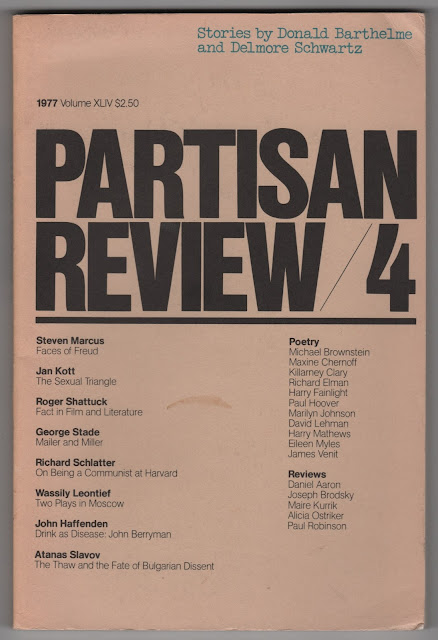Almost eleven years ago now, I mentioned here, in a review of notable mostly suspense-fiction anthologies having had a promising nibble from a small press publisher, an anthology I'd been mulling seemed close to happening, but no...and I might still go ahead, but part of what has been holding me up was whether to go the Poll Route, and give a ballot to various excellent writers in the field of what I call suspense fiction, and knowledgeable readers/fans, and see what they might like among my suggestions, and follow (or not) their own--many so-called Hall of Fame (and similar labels) volumes in various fields have been following that path over the decades. But the proposal has gone, in the way of many spec submissions to publishers, by the wayside or has at least been hanging fire.
 |
| Perhaps the most obscure of the volumes I reviewed... |
So might still, and so here's some easily revisable preliminary thoughts for such a volume...one which might try not to include Too many all but inevitable chestnut stories, but it'd be hard to put together such an anthology and leave out, say, "The Lottery" or "The Most Dangerous Game" or "Leiningen versus the ants" or "An Occurence at Owl Creek Bridge"...I had a long list of possibilities in one or another file, on one or another computer...
11 · Introduction · John D. MacDonald · in
17 · The Gold-Bug · Edgar Allan Poe · nv Philadelphia Dollar Newspaper Jun 21-28, 1843
48 · Hunted Down · Charles Dickens · nv New York Ledger Aug 20-Sep 3, 1859; EQMM Jan ’47
67 · The Stolen White Elephant · Mark Twain · nv The Stolen White Elephant, Webster, 1882; EQMM Jul ’43
85 · Ransom · Pearl S. Buck · nv Cosmopolitan Oct ’38; EQMM Jun ’55
108 · The Adventure of the Glass-Domed Clock [Ellery Queen] · Ellery Queen · ss Mystery League Oct ’33
126 · The Arrow of God [Simon Templar] · Leslie Charteris · nv EQMM Sep ’49; The Saint Detective Magazine (UK) Nov ’62; The Saint Detective Magazine Jan ’63
147 · A Passage to Benares [Prof. Henry Poggioli] · T. S. Stribling · nv Adventure Feb 20 ’26
174 · The Case of the Emerald Sky [Dr. Jan Czissar] · Eric Ambler · ss The Sketch Jul 10 ’40; EQMM Mar ’45
183 · The Other Hangman · John Dickson Carr · ss A Century of Detective Stories, ed. Anon., London: Hutchinson, 1935; EQMM Jan ’65
196 · The Couple Next Door [Inspector Sands] · Margaret Millar · ss EQMM Jul ’54
211 · Danger Out of the Past [“Protection”] · Erle Stanley Gardner · ss Manhunt May ’55; EQMM Mar ’61
223 · A Matter of Public Notice · Dorothy Salisbury Davis · nv EQMM Jul ’57
239 · The Cat’s-Paw · Stanley Ellin · ss EQMM Jun ’49
254 · The Road to Damascus [Daniel John Calder; Samuel Behrens] · Michael Gilbert · ss Argosy (UK) Jun ’66; EQMM May ’67
272 · Midnight Blue [Lew Archer] · Ross Macdonald · nv Ed McBain’s Mystery Book #1 ’60; EQMM Jul ’71
299 · I’ll Die Tomorrow · Mickey Spillane · ss Cavalier Mar ’60
310 · For All the Rude People · Jack Ritchie · ss AHMM Jun ’61
323 · Hangover · John D. MacDonald · ss Cosmopolitan Jul ’56
333 · The Santa Claus Club [Francis Quarles] · Julian Symons · ss Suspense (UK) Dec ’60; EQMM Jan ’67
344 · The Wager [Kek Huuygens] · Robert L. Fish · ss Playboy Jul ’73; EQMM Nov ’78
353 · A Fool About Money · Ngaio Marsh · ss EQMM Dec ’74
358 · And Three to Get Ready... · Horace L. Gold · ss Fantastic Sum ’52
368 · “J” [87th Precinct] · Ed McBain · nv, 1961
414 · Burial Monuments Three · Edward D. Hoch · ss AHMM May ’72
425 · The Murder · Joyce Carol Oates · ss Night-Side, 1977
434 · Fatal Woman · Joyce Carol Oates · ss Night-Side, 1977
439 · Agony Column · Barry N. Malzberg · ss EQMM Dec ’71
446 · Last Rendezvous · Jean L. Backus · ss EQMM Sep ’77
453 · The Real Shape of the Coast · John Lutz · ss EQMM Jun ’71
464 · Hercule Poirot in the Year 2010 [Hercule Poirot] · Jon L. Breen · ss EQMM Mar ’75
472 · Merrill-Go-Round [Sharon McCone] · Marcia Muller · ss The Arbor House Treasury of Mystery and Suspense, ed. Bill Pronzini, Barry N. Malzberg & Martin H. Greenberg, Arbor House, 1981
484 · A Craving for Originality · Bill Pronzini · ss EQMM Dec 17 ’79
491 · Tranquility Base · Asa Baber · ss, 1979
506 · The Cabin in the Hollow · Joyce Harrington · ss EQMM Oct ’74
519 · Peckerman · Robert S. Phillips · ss The Arbor House Treasury of Mystery and Suspense, ed. Bill Pronzini, Barry N. Malzberg & Martin H. Greenberg, Arbor House, 1981
531 · A Simple, Willing Attempt · Elizabeth Morton · ss The Arbor House Treasury of Mystery and Suspense, ed. Bill Pronzini, Barry N. Malzberg & Martin H. Greenberg, Arbor House, 1981
535 · Watching Marcia · Mike Resnick · ss The Arbor House Treasury of Mystery and Suspense, ed. Bill Pronzini, Barry N. Malzberg & Martin H. Greenberg, Arbor House, 1981
545 · Somebody Cares · Talmage Powell · ss EQMM Dec ’62
555 · Jode’s Last Hunt · Brian Garfield · ss EQMM Jan ’77
572 · Many Mansions · Robert Silverberg · nv Universe 3, ed. Terry Carr, Random House, 1973
596 · My Son the Murderer · Bernard Malamud · ss Esquire Nov ’68


















